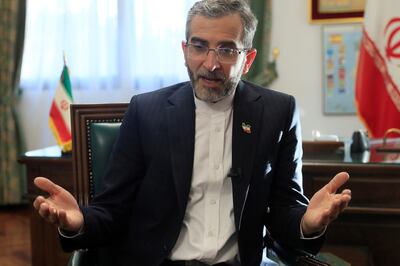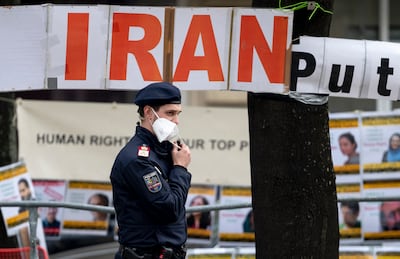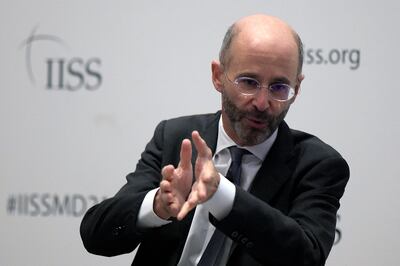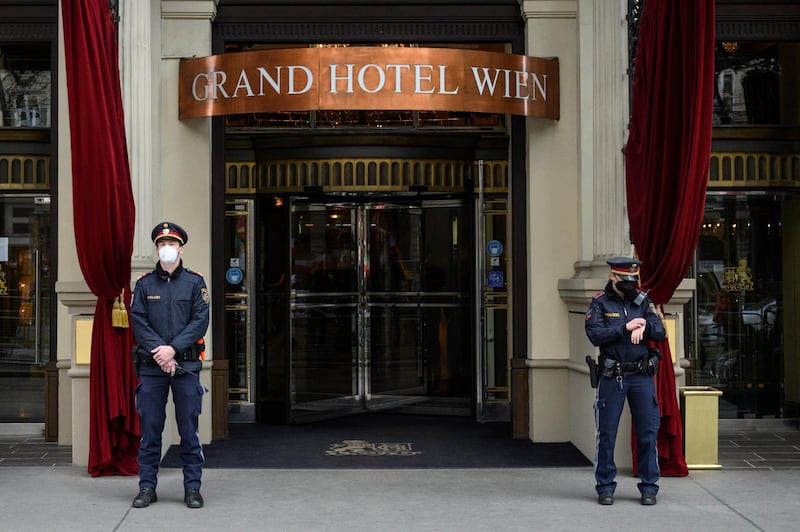Vienna has a long history of intrigue and diplomacy so when Ali Bagheri Kani, Iran's new nuclear negotiator, takes his place at a table with European counterparts on Monday it will be the latest leap in the dark at talks hosted in the city.
For start the man from Tehran won't get to break the ice with his most important interlocuter in the city. That is Rob Malley, the US envoy, who instead will remain in another hotel while mediators are expected shuttle between the two. Iran refuses to meet the US directly as long as America is maintaining, in the Iranian view, “unlawful and inhuman sanctions”.
The uncertainties hanging over the talks are manifold, not just at the personal level. The best that can be hoped for from negotiations is a “JCPOA minus”, experts told The National, referring to the deal struck in 2015 that stopped Iran’s uranium enrichment programme.
Six months have passed since the last round of Vienna talks to revive the agreement, which was thrown into disarray when Donald Trump arbitrarily pulled the US out of the Joint Comprehensive Plan of Action in 2018.
It was hoped in June that a snap deal resurrecting the 2015 agreement could be struck with the new US administration under President Joe Biden.

But with the newly elected, hardline Ebrahim Raisi about to assume power as President of Iran, a delay was inevitable. During the hiatus, Iran’s economy has worsened, Covid-19 continues to spread and Afghanistan has fallen to the Taliban with millions of refugees threatening to descend on Iran.
Optimism for agreement is low while the threat is high. If Iran went all-out, it could produce enough uranium for a bomb within a month, experts say.
Hence, expectations in Vienna are muted. Just being in a room – or the same city – and talking is seen as progress.
“Since the last round of negotiations, all sides are projecting a lot of negativity, because of the lack of contact and the posturing that has taken place in the media,” said Dr Sanam Vakil, an Iran specialist at the Chatham House think tank. “If there is an expectation, it is a negative one.”
Iran claims to have produced about 25 kilograms of uranium enriched to 60 per cent purity. While this is some distance from the 90 per cent needed for weapons, it is close enough to close the gap in a matter of months should Iran choose. The Iranians also continue to ban nuclear inspectors from its laboratories, adding to the pressure it wants to build to enhance its bargaining position.
With no sign of a quick return to nuclear deal, America has floated the idea of a “freeze for freeze” proposal in which Iran stops nuclear advancements in an exchange for the US halting further sanctions.

A slight improvement on that would be for Iran to agree on rolling back certain aspects of its nuclear programme in exchange for some sanctions relief. At least, says Dr Vakil, that would “buy people some breathing space”, even if it was only a “Band-Aid” on the 2015 agreement.
A potential improvement would be the “JCPOA minus” outcome suggested by Prof Michael Clarke, of the Rusi think tank in London. “It could be a ‘JCPOA minus’ that is quite a bit less than the original JCPOA with an agreement to keep talking with some sanctions still in place but the nuclear programme halted before a wider agreement is struck in a few years’ time,” he told The National.
An interim deal would at least buy time and potentially hold off a mass Israeli attack which would jeopardise the entire region’s stability.
For Mr Malley to get into the same hotel as Mr Kani, Washington has to accede to three Iranian demands. The US must admit culpability in withdrawing from JCPOA, sanctions must be lifted immediately and a cast-iron guarantee of no future withdrawals is necessary.
That final demand is crucial to the Iranians, who fear that the return of a US president such as Mr Trump and the “maximum pressure” sanction programme would derail their fragile economy once again.
Sanctions have clearly hurt Iran, which might make the regime more emollient than their belligerent language suggests, Prof Clarke said.
“The Iranian leadership need a deal because their economic situation is so bad that they need to show that hardliners can actually deliver for the economy and for that they need sanctions lifted," he said. "But they don't want to look as if they're anxious for it. Biden also needs a deal to show that his approach is better than Trump's. But he's probably under slightly less pressure than the Iranians.”

He suggested that Mr Trump’s policy of maximum pressure might actually have worked to the benefit of Mr Biden. “The Iranians are worried about a pressure cooker building among the people, particular the unemployed youth, which will make it very hard for them to deliver on the continuance of the Iranian Revolution.”
Furthermore, without sanctions the regime can cash in on the current windfall of increasing oil prices and precious foreign currency.
While Iran might be close to achieving sufficient fissile material for a bomb, it still has to develop a nuclear warhead and a missile to deliver it.
Israeli intelligence estimates that this could take two years, although Tehran might be developing a nuclear missile programme covertly.
“We don't know how advanced the secret warhead programme is but they’ve certainly been testing the missiles,” said Jeremy Binnie, an Iran missile expert for Jane's Defence Weekly. “The thinking is that any missile might not be fully ready yet as they've had some problems which will make mass production an issue.”
He said the Israelis would certainly look to attack any Iranian nuclear warhead site, “when they decide the time to strike would be, once they assess Iran’s capabilities”.
Therefore, what happens if the Vienna talks come to nought? That’s when Plan B is introduced and it could be an Israeli bunker-busting attack or the censure of Iran by the UN Security Council for blocking nuclear inspectors. With greater European Union and US alignment on pressuring Iran, Brussels could introduce harsh sanctions, making life even harder for Tehran.
And there is always the US military option. “That would be a risky gambit and one that could lead to a broader regional conflict and cost many regional states more than they're willing to expend,” said Dr Vakil.
She suggests that the best-case scenario from the talks is that Iran picks up from the progress made in June without “reviving ancient history”, which could then “build a bit of confidence” on all sides.
The more time it takes to strike a deal, the longer Iran has to develop its nuclear programme. With that comes the risk of a nuclear-equipped Iran changing the Middle East’s geopolitical compass and the threat of a war. Certainly, nuclear-armed Israel and most likely America will not stand back from military action.
“If diplomacy fails, we have other tools — and we will use other tools to prevent Iran from acquiring a nuclear weapon,” Mr Malley warned Tehran in a recent speech.
The stakes remain high. But at least — and at last — the serious talking has started.







